| Srl | Item |
| 1 |
ID:
069578
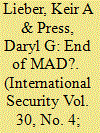

|
|
|
| 2 |
ID:
107170


|
|
|
| 3 |
ID:
152915
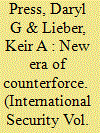

|
|
|
|
|
| Summary/Abstract |
Nuclear deterrence rests on the survivability of nuclear arsenals. For much of the nuclear age, “counterforce” disarming attacks—those aimed at eliminating an opponent's nuclear forces—were nearly impossible because of the ability of potential victims to hide and protect their weapons. Technological developments, however, are eroding this foundation of nuclear deterrence. Advances rooted in the computer revolution have made nuclear forces around the world considerably more vulnerable. Specifically, two key approaches that countries have relied on to ensure arsenal survivability since the dawn of the nuclear age—hardening and concealment—have been undercut by leaps in weapons accuracy and a revolution in remote sensing. Various methods, evidence, and models demonstrate the emergence of new possibilities for counterforce disarming strikes. In short, the task of securing nuclear arsenals against attack is far more difficult than it was in the past. The new era of counterforce challenges the basis for confidence in contemporary deterrence stability, raises critical issues for national and international security policy, and sheds light on one of the enduring theoretical puzzles of the nuclear era: why international security competition has endured in the shadow of the nuclear revolution.
|
|
|
|
|
|
|
|
|
|
|
|
|
|
|
|
| 4 |
ID:
080681
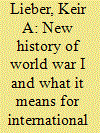

|
|
|
|
|
| Publication |
2007.
|
| Summary/Abstract |
World War I looms large in international relations theory. The core concepts of defensive realism-the security dilemma, spiral model, and offense-defense balance-were largely inspired by this single historical case, and evidence from the war is frequently used to test explanations built on those concepts. The new historiography of World War I, however, challenges many of the long-held assumptions about the origins of the conflict. Newly available evidence strongly suggests that German leaders went to war in 1914 with eyes wide open. They provoked a war to achieve their goal of dominating the European continent, and did so aware that the coming conflict would almost certainly be long and bloody. Germany's leaders did not go to war with a bold operational blueprint for quick victory embodied in the Schlieffen Plan; they did not misjudge the nature of modern war; and they did not lose control of events on the eve of the conflict and attack out of fear that Germany's enemies would move first. In light of the new history, international relations scholars should reexamine their empirical understandings of this conflict, as well as their theoretical presuppositions about the causes of war.
|
|
|
|
|
|
|
|
|
|
|
|
|
|
|
|
| 5 |
ID:
091458
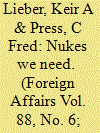

|
|
|
|
|
| Publication |
2009.
|
| Summary/Abstract |
The Obama administration is right that the United States can safely cut some of its nuclear arsenal, but it must retain the right capabilities. Otherwise, the United States' adversaries might conclude -- perhaps correctly -- that Washington's nuclear strategy rests largely on a bluff.
|
|
|
|
|
|
|
|
|
|
|
|
|
|
|
|
| 6 |
ID:
068235
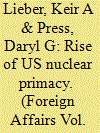

|
|
|
| 7 |
ID:
065315


|
|
|
| 8 |
ID:
122086
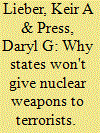

|
|
|
|
|
| Publication |
2013.
|
| Summary/Abstract |
Many experts consider nuclear terrorism the single greatest threat to U.S. security. The fear that a state might transfer nuclear materials to terrorists was a core justification for the invasion of Iraq in 2003 and, more recently, for a strike against Iran's nuclear program. The logical basis for this concern is sound: if a state could orchestrate an anonymous nuclear terror attack, it could destroy an enemy yet avoid retaliation. But how likely is it that the perpetrators of nuclear terrorism could remain anonymous? Data culled from a decade of terrorist incidents reveal that attribution is very likely after high-casualty terror attacks. Attribution rates are even higher for attacks on the U.S. homeland or the territory of a major U.S. ally-97 percent for incidents in which ten or more people were killed. Moreover, tracing a terrorist group that used a nuclear weapon to its state sponsor would not be difficult, because few countries sponsor terror; few terror groups have multiple sponsors; and only one country that sponsors terrorism, Pakistan, has nuclear weapons or enough material to manufacture them. If leaders understand these facts, they will be as reluctant to give weapons to terrorists as they are to use them directly; both actions would invite devastating retaliation.
|
|
|
|
|
|
|
|
|
|
|
|
|
|
|
|